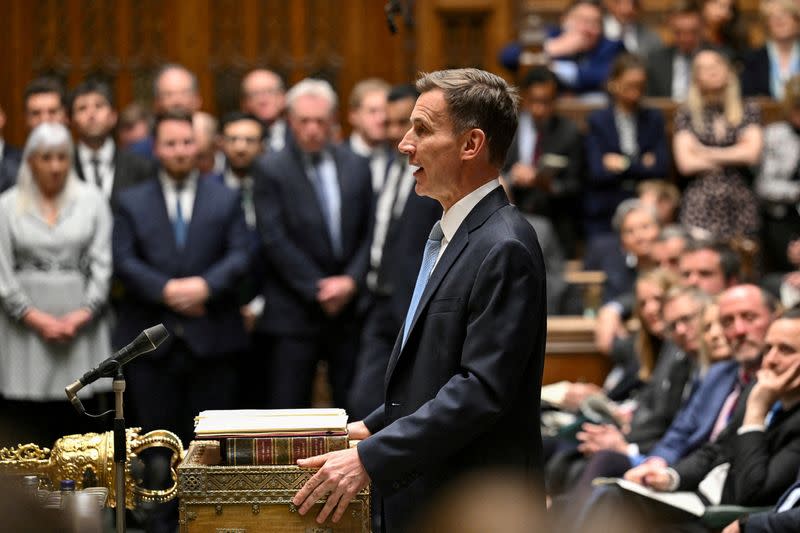'Fiscal fiction' underpins UK's pre-election budget, economists say

By Andy Bruce
LONDON (Reuters) - The assumptions underpinning British finance minister Jeremy Hunt's new pre-election budget plan stretch the bounds of credulity and leave urgent questions about the future of public services unaddressed, economists said on Thursday.
Billed as a "Budget for Long-Term Growth", Hunt cut taxes for workers without running afoul of his government's fiscal rules - by a historically slim margin of 8.9 billion pounds ($11.4 billion), equivalent to less than 1% of annual day-to-day public spending.
The plans rest on assumptions that economists from think tanks and major banks deemed unlikely to prove true.
They include a productivity renaissance, a marked surge of economic growth and huge real-terms spending cuts in the years ahead to areas of public spending that have yet to be defined.
Hunt hopes his two-percentage-point cut in the rate of social security contributions will help his struggling Conservatives narrow a wide gap with the opposition Labour Party before an election expected later this year.
Whichever party wins will have to face up to "eye-watering" budget choices forced by the realities of Britain's economic situation, Paul Johnson, director of the Institute for Fiscal Studies think tank, said.
These include an ageing population, higher borrowing costs, weak rates of investment and economic growth, a crumbling health service and a widening financial collapse of local authorities.
"This was not a budget which addressed the real challenges we are facing because it was not transparent about what those challenges are," Johnson said, adding that the Labour Party had been "complicit" in silence about these challenges too.
Hunt on Thursday dismissed criticism that his budget did not address Britain's problems, telling BBC radio that it was a long-term plan to improve public services and attract investment.
One of the key budget assumptions is that Britain's annual productivity growth - forecast by the Office for Budget Responsibility which has a long history of overestimating it - will double to 0.9% in the coming years, helped by technology like artificial intelligence.
U.S. bank Citi said Britain would struggle to achieve this in a "more disrupted, volatile world" and instead thought productivity growth would remain at around 0.5% - enough to worsen the borrowing outlook by around 30-35 billion pounds.
It also doubted that Britain would be able to enact steep real-terms cuts that are pencilled in for public services other than protected areas such as health, education and defence, worth around 20 billion pounds a year.
"We therefore continue to see the UK as fiscally offside by around 50-60 billion pounds - falling to 15-20 if (bonds) rally as we currently expect," said Citi economist Benjamin Nabarro.
Higher bond prices would lower the cost of government borrowing.
"We think post-COVID fiscal headwinds are only just beginning," Nabarro added.
The Resolution Foundation similarly cast doubt on plans to slash public spending on unprotected departments by the scale envisaged in the budget, calling it "fiscal fiction".
It remains to be seen whether the election manifestos of either the Conservatives or the Labour Party will tackle Britain's economic constraints.
"They will need to both wrestle with implausible spending cuts, and also restart sustained economic growth - the only route to end Britain's stagnation," said Resolution Foundation chief executive Torsten Bell.
($1 = 0.7839 pounds)
(Reporting by Andy Bruce; Editing by Bernadette Baum)


